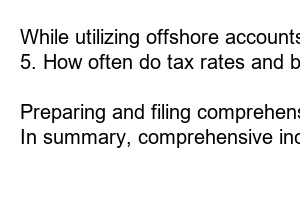종합소득세 대상자
Subject to Comprehensive Income Tax: Understanding the Basics
Whether you’re a new employee or a seasoned professional, understanding the concept of comprehensive income tax is essential. This blog post aims to provide a clear and concise explanation of this often confusing topic. So, let’s dive in and unravel the mysteries behind comprehensive income tax!
1. What is Comprehensive Income Tax?
Comprehensive income tax refers to the taxation of an individual’s total income from all sources, including employment, investments, and other financial activities. It encompasses various types of taxes, such as federal and state income taxes, social security contributions, and Medicare taxes.
2. How is Comprehensive Income Tax Calculated?
To calculate your comprehensive income tax, you need to determine your total income and apply the appropriate tax rates. Income can include wages, salaries, bonuses, rental income, interest, dividends, capital gains, and much more. Once you’ve identified your income sources, consult the tax brackets and rates provided by your country’s tax authority to determine the applicable tax rate for each income bracket.
3. What are the Advantages of Comprehensive Income Tax?
Comprehensive income tax brings several benefits. For one, it helps fund government programs and services, such as infrastructure, education, healthcare, and defense. Additionally, it promotes social equity by redistributing wealth and bridging income disparities between different socio-economic groups. It also ensures that individuals contribute based on their ability to pay, as taxes are generally progressive, meaning higher earners pay a higher percentage of their income in taxes.
4. Potential Challenges and Limitations
While comprehensive income tax has its advantages, there are also challenges and limitations to consider. Some argue that excessive taxation can hinder economic growth and discourage investment. Moreover, determining the appropriate tax rate for each income bracket can be complex, leading to potential errors or discrepancies. Additionally, tax evasion and avoidance remain significant concerns, as individuals and businesses may try to minimize their tax liabilities through legal or illegal means.
5. Strategies for Minimizing Comprehensive Income Tax
While it’s important to pay your fair share of taxes, there are legal strategies you can employ to minimize your comprehensive income tax burden. These include taking advantage of tax deductions and credits, contributing to tax-advantaged retirement accounts, strategically timing capital gains and losses, and setting up residency in a tax-friendly jurisdiction.
6. Seeking Professional Advice
Navigating the complexities of comprehensive income tax can be a daunting task. To ensure compliance and maximize tax benefits, it’s wise to seek advice from qualified tax professionals or certified public accountants. They can provide personalized guidance based on your specific circumstances and help you optimize your tax situation.
FAQs:
1. What is the difference between comprehensive income tax and regular income tax?
Regular income tax refers to the taxation of an individual’s earnings solely from employment, while comprehensive income tax includes income from all sources, including investments and other financial activities.
2. Is comprehensive income tax the same across all countries?
No, comprehensive income tax rates and structures vary from country to country. It’s important to consult your local tax authority for accurate and up-to-date information.
3. Can I deduct expenses from my comprehensive income tax?
Yes, certain expenses may be deductible, such as business expenses, mortgage interest, and charitable contributions. Consult a tax professional to determine what expenses you can deduct.
4. Can I minimize my comprehensive income tax through offshore accounts?
While utilizing offshore accounts may provide tax advantages in some circumstances, it’s crucial to comply with all relevant tax laws and regulations. Improper use of offshore accounts can lead to severe penalties and legal issues.
5. How often do tax rates and brackets change?
Tax rates and brackets can change periodically due to legislative updates or government policies. Stay informed by regularly checking your country’s tax authority website or consulting a tax professional.
6. Can I prepare and file my comprehensive income tax returns myself?
Preparing and filing comprehensive income tax returns can be complex. While it’s possible to do it yourself, seeking professional assistance can ensure accuracy and maximize tax benefits.
In summary, comprehensive income tax involves the taxation of an individual’s total income from all sources. Understanding how it’s calculated, its advantages and challenges, as well as strategies for minimizing tax, are essential for personal financial management. Seek professional advice, stay informed, and optimize your tax situation accordingly.

